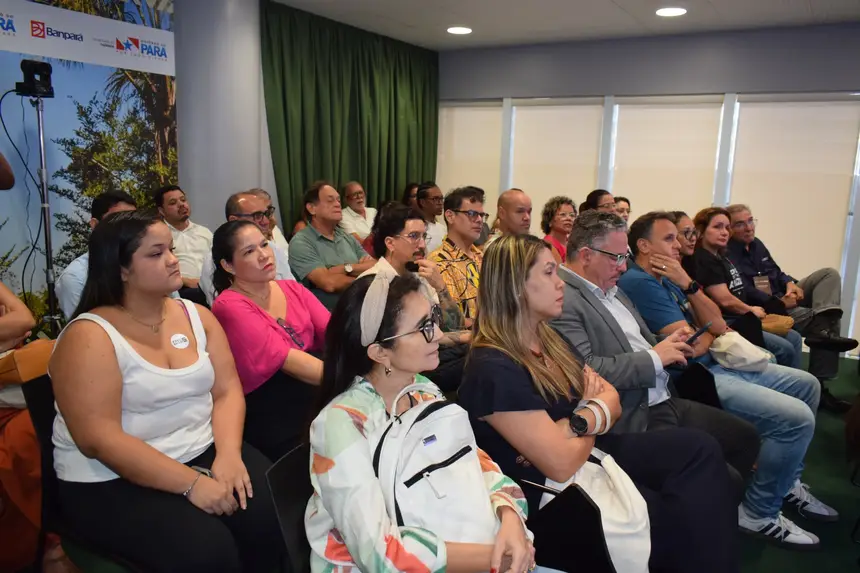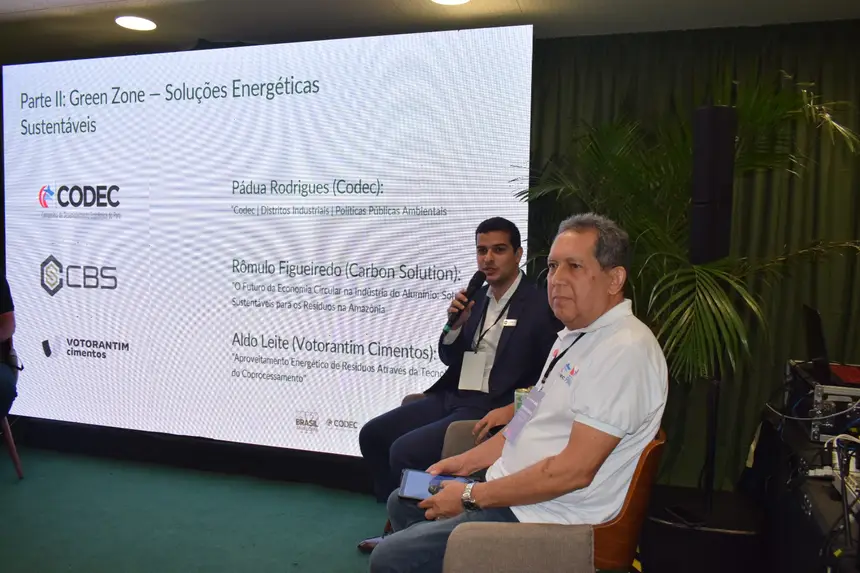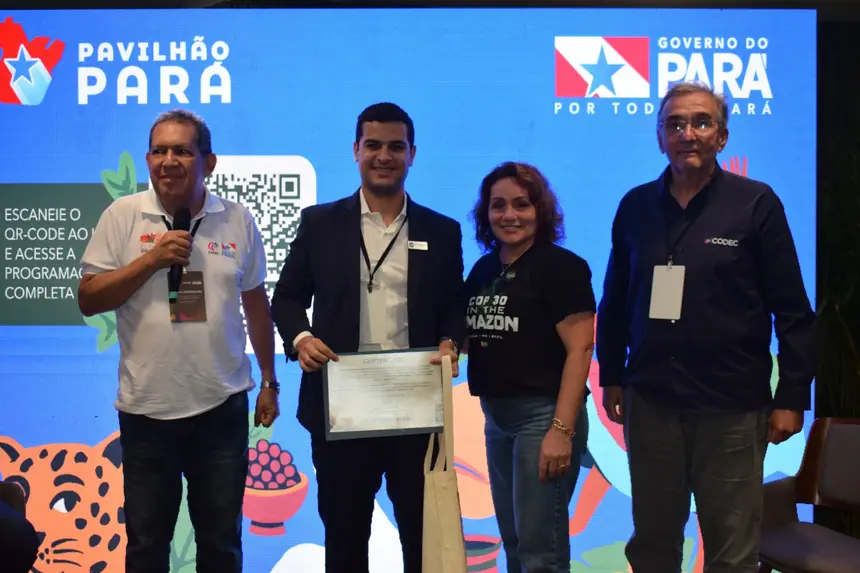Codec expands debate at COP30 on decarbonization in industry and circular economy
Aluminum and cement chain solutions reinforce Pará's leadership in climate innovation, waste management, and energy transition
The Pará Economic Development Company (Codec) returned to the Green Zone of COP30 on the afternoon of this Wednesday (19), at the Pará Pavilion, to conduct the second stage of the panel on decarbonization and circular economy. In the Miritizeiro Room, the meeting brought together representatives from the government and industry, experts, and civil society to present initiatives that are already reducing emissions in industrial parks, strengthening productive chains, and consolidating Pará as a national leader in sustainable innovation.

The program continued from the first panel, held on the 15th, and was led by the Director of Strategy and Institutional Relations of Codec, Pádua Rodrigues, who highlighted the strategic role of Pará's public policies in addressing the climate crisis. For him, the State is at a decisive moment by integrating economic development, land use planning, and long-term environmental commitments.
“Decarbonization is not an empty discourse. It is a public policy of the State, which organizes the present and defines the future we want for Pará,” he emphasized.
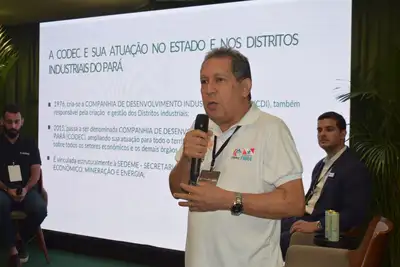
Pádua Rodrigues emphasized the impact of energy and transportation modalities on carbon emissions and reinforced the need for structural choices to reduce climate impacts. “The climate emergency calls for effective actions in various spheres, including transportation modalities, to reduce the use of fossil fuels. A railway, planned sustainably, reduces gas emissions by about 25% compared to road transport. This is the type of decision that changes the trajectory of an entire territory,” he highlighted.
He also recalled concrete measures adopted by the State, such as the exemption of IPVA for electric vehicles, the State Bioeconomy Plan, and the environmental matrix developed by Semas (State Secretariat for the Environment, Climate, and Sustainability), both recognized as national and international references.

Circular economy and aluminum chain - Carbon Solution, represented by Rômulo Figueira, showed how the company has become a key player in the circular economy of the aluminum chain, a sector that concentrates some of the country's most complex industrial waste. Based in Pará, Carbon operates from the generation to the processing of carbonaceous and non-carbonaceous waste from the smelter (primary aluminum production unit), ensuring productive and environmentally safe returns.
Rômulo Figueira explained that, historically, a large part of this waste was underutilized or discarded, at a high cost. Today, Carbon transforms this liability into strategic raw material for industries in the region, replacing fossil inputs, reducing emissions, and adding value to the metallurgical sector. “What was once waste without utility and high environmental cost now returns to the chain as high-value technical raw material,” he stated.
The company's monthly operation handles between 3,000 and 4,000 tons of processed waste, all processed in Pará, which means tax retention, strengthening the local economy, and significant reduction of interstate cargo transport.

Another highlighted point was the social impact. With 85% of the team composed of locals, Carbon invests in training and inclusion, including literacy projects for adults from neighboring communities. “We want to give back opportunity, dignity, and education to the people living around our operations,” Rômulo Figueira added.
Energy innovation - Votorantim Cimentos presented two cases that illustrate the energy transition in the cement and construction industry. Company engineer Aldo Alex Leite de Souza detailed the increasing use of biomass and alternative fuels as drivers of the sector's reconfiguration. He explained that the company has structured a sustainable chain that replaces fossil fuels with energy derived from waste and industrial by-products. “Our goal is clear: to replace fossil fuels, transform waste into clean energy, and reduce our sector's carbon footprint,” he assured.

Among the highlights is the pioneering case of reusing açaí seeds as an energy source, a solution that transformed a decades-old environmental liability in the Metropolitan Region of Belém into a high-performance renewable alternative. “We turned a historical public health problem into a sustainable energy solution,” reinforced Aldo de Souza.
Next, Herbert do Nascimento, manager of Votorantim's mortar factory in Belém, presented the results of the unit installed in the Industrial District managed by Codec. The plant has been operating for over two years with 100% thermal substitution, using exclusively biomass in the production process, without consuming diesel oil or fossil gas. “We haven't used a liter of diesel oil since then. Zero. Everything is biomass. This is real impact on emission reduction,” he guaranteed.
The factory has reached its maximum capacity and is preparing for a significant expansion in 2026, with an initial investment of R$ 26 million, which will allow it to operate with new renewable sources, such as wood chips, and expand the supply to the entire North region and part of the Northeast. Herbert do Nascimento also highlighted the appreciation of local labor. “Our legacy is not just industrial. It is human. Today, it is local leaders who command strategic operations of Votorantim in the State,” he concluded.
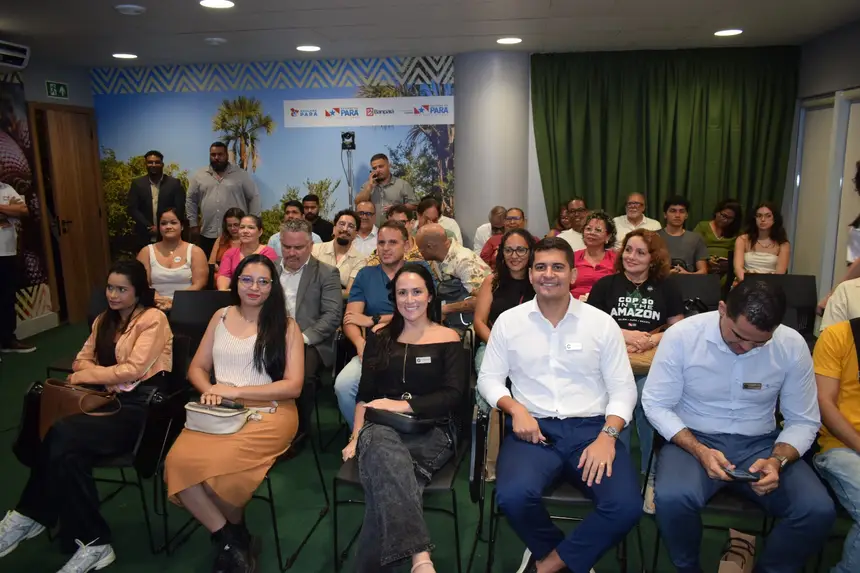
Pará is a national reference - At the end of the panel, Director Pádua Rodrigues reinforced that Pará is experiencing a historic moment by consolidating policies that unite economic growth and climate commitment. “Pará is at the forefront. Our policies are being replicated in other states because they represent a strategic vision that needs to be embraced with courage,” he emphasized.
Codec announced that it will expand dialogue with the productive sector and promote new technical seminars to deepen topics such as decarbonization, sustainable logistics, circular economy, and industrial innovation.


